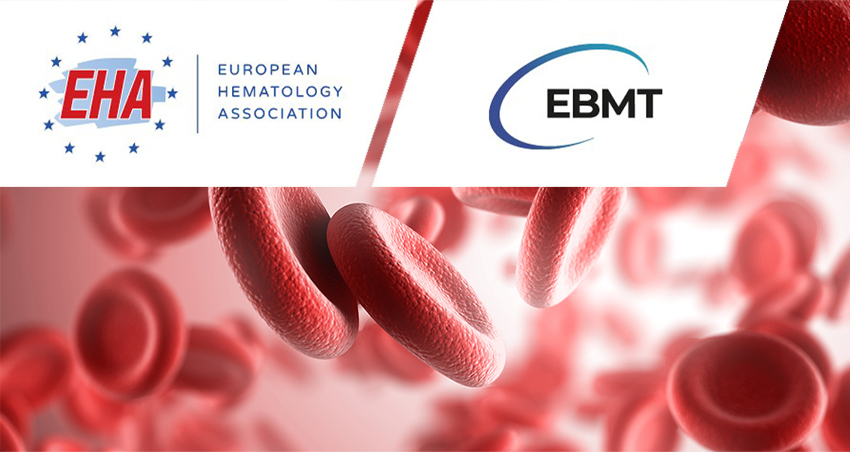Strategic Partnership: EBMT and EHA aim to position Europe in the lead of the global cellular therapy field with the new GoCART coalition

PRESS RELEASE
Strategic Partnership: EBMT and EHA aim to position Europe in the lead of the global cellular therapy field with the new GoCART coalition
The Hague, Wednesday 18, November, 2020
The field of cell and gene therapy is one of the most exciting developments in medicine. The European Society of Blood and Marrow Transplantation (EBMT) and the European Hematology Association (EHA) announce a strategic partnership to empower Europe to become a global leader in the cellular therapy field for haematological diseases. The two leading European societies in the field of haematology and stem cell transplantation join forces and bring their collective resources and expertise to the newly founded GoCART coalition.
Advancing the field of cell and gene-based therapies requires progress on multiple fronts, including creating a pre- and post-authorisation registry to monitor product safety and efficacy; harmonising data collection, centre qualification and educational requirements; overcoming barriers in regulations designed for more traditional pharmaceutical products, that affect preparation, administration and patient access to these novel therapies. To address such a wide range of complex issues, there is a need for strong collaboration amongst all relevant stakeholders. The aim of the GoCART coalition is to support patients’ access to novel gene and cellular therapies manufactured from cells and tissues of hematopoietic origin, and to contribute to their health and well-being through innovation by multi-stakeholder collaboration on clinical data, standards of care, education and policy.
EBMT and EHA have different strengths, but both organisations have an extensive track record in collaborating with relevant stakeholders in the field, from patient representatives and health care professionals to health authorities and pharmaceutical companies. This informal network is now brought together and expanded under the umbrella of the GoCART coalition.
“This is historic, two large European organisations with a limited history of working together, have now joined forces,” comments Nicolaus Kröger, EBMT President. “With this example, we are sending a signal to other stakeholders of the possibilities to find common ground and achieve alignment. Only when we combine and leverage our individual strengths, can we move the field of cellular therapies forward.”
John Gribben, EHA President adds: “We should avoid duplicating our efforts. What is more, we are not looking to be additive, we are looking to be synergistic so we can continue to build on and accelerate the excellent work that is already being done in Europe in the field of immunotherapy.
The goals of the GoCART coalition are ambitious and as co-founders of GoCART, EBMT and EHA will initially focus on setting up the coalition’s structure and worklines to ensure success in the long run. The network is open to any relevant stakeholder, including patient representatives, health care professionals, pharmaceutical companies, health authorities, health technology assessment bodies and reimbursement agencies, European and national medical organisations and registry holders. A governance structure for the multi-stakeholder coalition will be formalised. The first concrete activities underway include the development of a joint educational programme, a multi-stakeholder review of EBMT’s cellular therapy data collection form, and harmonisation of existing site qualification schemes to reduce inspection burden for hospitals. These are some of the areas that show the potential of this coalition to advance the field of gene and cellular therapies in Europe in the interests of our patients.
About the GoCART Coalition
GoCART is a multi-stakeholder coalition in the field of gene and cellular therapies manufactured from cells and tissues of hematopoietic origin. This new Coalition brings together stakeholders from across the sector, including patients, health care professionals, health authorities, HTA bodies and reimbursement agencies, pharmaceutical companies and medical non-profit organisations.
The aim of GoCART is to promote patient access to novel cellular therapies and to contribute health and well-being through innovation by multi-stakeholder collaboration on clinical data, standards of care, centre qualification, education and policy.
- For further information about GoCART, please visit www.ebmt.org/ebmt/gocart-coalition
- Contact : Sofie Terwel, GoCART Project Coordinator, Email: sofie.terwel@ebmt.org
About the European Hematology Association (EHA)
The European Hematology Association (EHA) promotes excellence in patient care, research and education in hematology. EHA envisions a cure for all blood disorders by connecting hematologists worldwide, supporting their career development, harmonizing hematology education and advocating the interests of hematology and hematologists in the European arena to achieve more and better research funding opportunities, improve regulation, increase the availability and affordability of medicines, and harmonize education and training of hematologists. With around 5,000 members from 100+countries, EHA is Europe’s largest professional organization supporting both clinicians and scientists around the globe in their efforts to cure blood diseases.
- For more information about EHA, please visit www.ehaweb.org.
- Follow EHA on LinkedIn, Twitter, Facebook, and Instagram.
About the European Society of Blood and Marrow Transplantation (EBMT)
The EBMT is a not-for-profit medical and scientific organisation established in 1974. It is dedicated to fighting life-threatening blood cancers and diseases and improving patients’ lives with more than 5,000 physicians, nurses, scientists and other healthcare professionals - participating in a unique collaborative network of peers involved in haematopoietic stem cell transplantation (HSCT) and cellular therapy research.
The Registry is the backbone of the EBMT. It is the only data source of its kind in Europe. The data is submitted continuously by EBMT centre members. The Registry has data on HSCT procedures including details on disease, transplant type, donor type and stem cell source. It contains data on patients that have undergone HSCT and also patients receiving immunosuppressive therapies or cellular therapies. The Registry also offers the possibility to enter donors’ follow-up data, which is crucial to ensure maximum donor safety.
The Registry underpins extensive European research that translates into changes in clinical practice and improvements in patient outcome and care.
- For further information about the EBMT, please visit ebmt.org.
- Follow EBMT on LinkedIn, Twitter, and Facebook.



 Back
Back